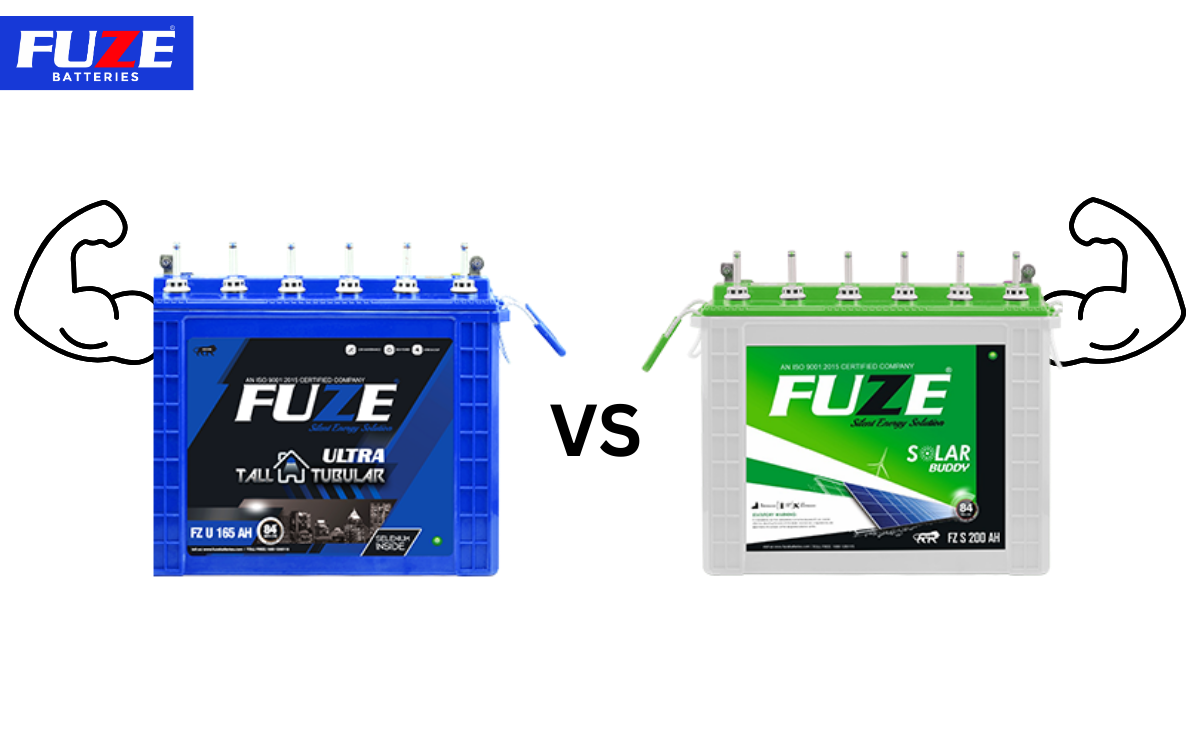In a world that’s increasingly embracing renewable energy and sustainable power solutions, the choice of batteries for various applications has never been more critical. Among the options available, tubular batteries and solar batteries hold prominent positions. But what sets them apart? In this comprehensive guide, we will delve into the key distinctions between tubular batteries and solar batteries, and explore their unique characteristics, applications, and benefits.
Tubular Batteries: Powering Your Backup Needs
Longevity and Durability of Tubular Batteries
Tubular batteries are well-regarded for their exceptional durability and longevity. These batteries are built to withstand the rigors of frequent discharges and recharges, making them ideal for backup power systems. The unique design of tubular batteries, with tubular positive plates, provides enhanced resistance to corrosion and ensures a longer service life. This feature makes them a reliable choice for applications that require sustained backup power, such as uninterruptible power supply (UPS) systems and inverters.
Efficient Energy Storage for Backup Power
Tubular batteries are renowned for their efficient energy storage capabilities. They have a high charge acceptance rate and low self-discharge rate, which means they can quickly recharge and store energy effectively. This makes them well-suited for environments where power interruptions are common, as they can provide backup power when needed without any delay.
Applications and Benefits of Tubular Batteries
Tubular batteries find applications in a wide range of scenarios, including home backup power, industrial backup power, and off-grid power systems. Their robust design and efficient energy storage make them an excellent choice for regions with unreliable electricity grids. Additionally, tubular batteries require minimal maintenance, making them a hassle-free solution for both residential and commercial users.
Solar Batteries: Harnessing the Power of the Sun
Storing Solar Energy for Sustainable Power
Solar batteries are a crucial component of off-grid and grid-tied solar power systems. These batteries store excess energy generated by solar panels during the day for use during periods of low sunlight or at night. Solar batteries are designed to efficiently capture and store this renewable energy, making them indispensable for harnessing the power of the sun.
Optimizing Efficiency with Solar Batteries
One of the primary advantages of solar batteries lies in their ability to optimize the efficiency of solar power systems. They can help balance energy supply and demand, ensuring that you have a steady source of electricity even when the sun isn’t shining. This feature not only enhances the reliability of solar energy systems but also contributes to cost savings by reducing the need for backup generators or drawing power from the grid.
Advantages of Solar Batteries in Renewable Energy Systems
Solar batteries play a pivotal role in renewable energy systems. They enable homeowners and businesses to reduce their reliance on non-renewable energy sources and decrease their carbon footprint. By efficiently storing excess solar energy, these batteries promote self-sufficiency and reduce the environmental impact of energy consumption. Furthermore, they are an ideal solution for areas with intermittent grid access or those seeking energy independence.
Making the Right Choice
When it comes to selecting between tubular batteries and solar batteries, the choice depends on your specific requirements and the intended application. Tubular batteries are designed to deliver reliable backup power, making them an excellent choice for areas with frequent power outages. On the other hand, solar batteries are integral to harnessing solar energy efficiently, promoting sustainability, and reducing reliance on the grid.
Understanding the unique characteristics, applications, and benefits of each battery type will help you make an informed decision that aligns with your energy needs and sustainability goals. Whether you are looking to ensure an uninterrupted power supply during outages or maximize the use of solar energy, both tubular batteries and solar batteries have their distinctive roles to play in the realm of energy storage and management.
In the vibrant state of Kerala, renowned for its scenic beauty and embrace of sustainable energy solutions, Fuze stands out as a distinguished battery manufacturer. Specializing in both solar batteries and tubular batteries, Fuze has made a significant impact on the energy landscape in the region. As a solar battery manufacturer in Kerala, Fuze plays a vital role in helping individuals and businesses leverage the abundant sunshine of the state to generate and store their renewable energy. Their solar batteries are engineered for efficiency and reliability, ensuring that solar power remains a sustainable and accessible energy source. Additionally, as a tubular battery manufacturer in Kerala, Fuze caters to the growing need for dependable backup power solutions in a region where electricity grid fluctuations are common. Fuze’s commitment to providing high-quality, durable, and environmentally responsible battery solutions makes it a valuable contributor to Kerala’s energy sustainability and resilience. Whether for harnessing the sun’s energy or ensuring reliable backup power, Fuze is at the forefront of empowering Kerala with dependable battery technology.
Follow Us:

